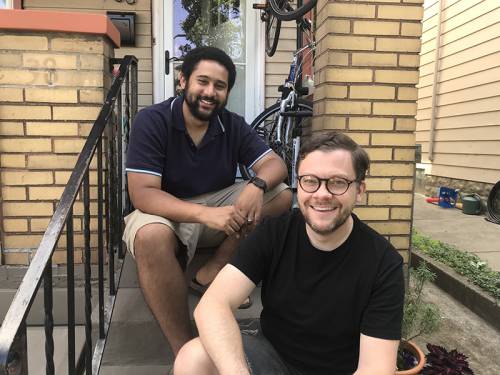Two PTS alumni lead an anti-racism collective in Pittsburgh
Even through a computer screen, the Rev. Mike Holohan ’10 and the Rev. Gavin Walton ’16 exude hospitality and friendliness. It’s easy to see why both are pastors, capable of delicately balancing speaking with listening, and the pastoral with the prophetic.
Together, Gavin and Mike lead an anti-racist collective in Pittsburgh. For almost three years—since the acceleration of the Black Lives Matter movement after the killing of George Floyd—they have organized monthly meetings on Zoom with area leaders who desire a space for meaningful conversation and learning.
“The idea was to create an environment or a space where people can come together, sustain each other, and hold each other accountable in their anti-racist work, and not just let the flame die out when the moment passed,” says Gavin, pastor of Grace Memorial PC in Pittsburgh and PTS Board member. “That moment awoke something in the consciousness of America, and it was incumbent on people of faith to come together and respond and see what could be possible in our own spaces.”
Space for Anti-Racist Support and Growth
As friends and colleagues, Gavin and Mike sensed a need to keep the momentum going here in Pittsburgh. But they soon recognized that many organizations were already doing significant work. What was needed was a space to build trusting relationships.
Mike is the pastor of The Commonwealth of Oakland, a non-traditional church founded in 2018. Of the anti-racist collective, he says: “The focus of this group particularly is on relationships and accountability. When something particularly tragic gets in the news cycle, a lot of white people get activated to do something about it, and then move on by the next new cycle. And so this needs to be like a lifetime commitment of work. How do we hold each other accountable to doing this work long-term?”
The collective has also become a place for religious and community leaders to learn about events and initiatives others are doing. And it is always a sacred space for people to speak or ask questions in an effort to continue growing and learning. Gavin says it’s still an experiment in the process of being shaped. But a major focus is on supporting and sustaining the work through relationships.
Engaging Difference with Courage
Because it’s an experiment, sometimes things don’t go as smoothly as expected. Last year, after conflict erupted in one of their meetings, two participants later connected in an attempt to more clearly understand each other. “That’s exactly in line with the values we’re trying to live into. Rather than conflict repelling each other, we allow it to draw people together,” Mike says. In contrast to other organizing models that attempt to minimize difference, the collective aspires to lean into difference more courageously.
Gavin adds that this practice is less about resolving tension and more about learning to live amid the tension. He credits Pittsburgh Seminary for helping him to be more comfortable with engaging difference. And he recognizes this skill as essential to Christian ministry and community leadership. And both he and Mike are encouraged by the Seminary’s recent efforts to make racial justice more central to its curriculum and programming so that all students learn how best to engage in relationships across racial and ethnic difference.
“We’re under no illusion that racism will end in our lifetime or even our kids’ lifetime. So relationships are the only thing that will get us through,” he says. “If we’re going to walk alongside each other, I need to know what matters to you.”

